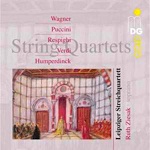Puccini’s early Crisantemi (1890) already hints at the dramatic style to come in the composer’s Manon Lescaut–its two principal themes resurface in the opera–but this work has touching melancholy that’s ideally realized in its original string quartet version. Respighi’s tender Il Tramonto has less in common with the composer’s dramatic operas than with similar works by Schönberg and Berg (in style, not musical language). The vocal line, beautifully sung by soprano Ruth Ziesak, does have a recitative-like quality, but the overall mood is meditative, at times prayerful. This mood continues in Wagner’s very brief (lasting less than two minutes) Tristan-like Albumblatt.
With its engaging tunes and rhythmic energy, Humperdinck’s String Quartet aspires to emulate Dvorák, but falling short of that lofty goal, it settles for sounding like Mendelssohn. I suspect some of this impression stems from the Leipzig Quartet’s performance, with its emphasis on the “moderato” of the first movement’s Allegro moderato marking and its rather relaxed way with accents and rhythms. Yet in the remaining two movements the players revel in Humperdinck’s beautiful melodies.
Verdi’s lone string quartet, which brims with the composer’s trademark melodic invention and dramatic sense, makes you wish he’d written more. That’s certainly the case when listening to the Leipzig’s taut reading, which has the edge that was missing from the Humperdinck.
The recording places the quartet in a large, reverberant acoustic that, although capturing considerable detail, renders the performers’ attacks slightly less incisive than is ideal for these works. Overall, however, this is a well planned and well executed album that string quartet fanciers are sure to enjoy. [8/11/2008]
































